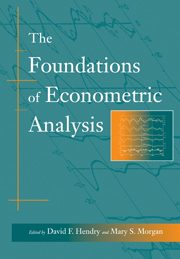Book contents
- Frontmatter
- Contents
- Preface
- Acknowledgements
- Introduction
- Bibliography
- I The Emerging Role of Econometrics in Economics
- II Early Time-Series Analysis
- III Applied Econometrics and the Identification Problem
- IV The Evolution of Statistical Thinking in Econometrics
- V Dynamic Models
- VI The Tinbergen Debate
- VII Structure and Simultaneity
- VIII The Probabilistic Revolution
- 42 The Probability Approach in Econometrics (Supplement to Econometrica, vol. 12, 1944, pp. iii–iv, 1–11, 49–52, 114–15)
- 43 ‘Measurement without Theory’ Debate (Review of Economics and Statistics, vol. 29, 1947, pp. 161–72 (cut); vol. 31, 1949, pp. 77–93 (cut); and Journal of the American Statistical Association, vol. 46, 1951, pp. 388–90)
- IX Exogeneity
- Index
42 - The Probability Approach in Econometrics (Supplement to Econometrica, vol. 12, 1944, pp. iii–iv, 1–11, 49–52, 114–15)
Published online by Cambridge University Press: 05 June 2012
- Frontmatter
- Contents
- Preface
- Acknowledgements
- Introduction
- Bibliography
- I The Emerging Role of Econometrics in Economics
- II Early Time-Series Analysis
- III Applied Econometrics and the Identification Problem
- IV The Evolution of Statistical Thinking in Econometrics
- V Dynamic Models
- VI The Tinbergen Debate
- VII Structure and Simultaneity
- VIII The Probabilistic Revolution
- 42 The Probability Approach in Econometrics (Supplement to Econometrica, vol. 12, 1944, pp. iii–iv, 1–11, 49–52, 114–15)
- 43 ‘Measurement without Theory’ Debate (Review of Economics and Statistics, vol. 29, 1947, pp. 161–72 (cut); vol. 31, 1949, pp. 77–93 (cut); and Journal of the American Statistical Association, vol. 46, 1951, pp. 388–90)
- IX Exogeneity
- Index
Summary
Preface
This study is intended as a contribution to econometrics. It represents an attempt to supply a theoretical foundation for the analysis of interrelations between economic variables. It is based upon modern theory of probability and statistical inference. A few words may be said to justify such a study.
The method of econometric research aims, essentially, at a conjunction of economic theory and actual measurements, using the theory and technique of statistical inference as a bridge pier. But the bridge itself was never completely built. So far, the common procedure has been, first to construct an economic theory involving exact functional relationships, then to compare this theory with some actual measurements, and, finally, ‘to judge’ whether the correspondence is ‘good’ or ‘bad’. Tools of statistical inference have been introduced, in some degree, to support such judgements, e.g., the calculation of a few standard errors and multiple-correlation coefficients. The application of such simple ‘statistics’ has been considered legitimate, while, at the same time, the adoption of definite probability models has been deemed a crime in economic research, a violation of the very nature of economic data. That is to say, it has been considered legitimate to use some of the tools developed in statistical theory without accepting the very foundation upon which statistical theory is built. For no tool developed in the theory of statistics has any meaning – except, perhaps, for descriptive purposes – without being referred to some stochastic scheme.
Information
- Type
- Chapter
- Information
- The Foundations of Econometric Analysis , pp. 477 - 490Publisher: Cambridge University PressPrint publication year: 1995
Accessibility standard: Unknown
Why this information is here
This section outlines the accessibility features of this content - including support for screen readers, full keyboard navigation and high-contrast display options. This may not be relevant for you.Accessibility Information
- 2
- Cited by
